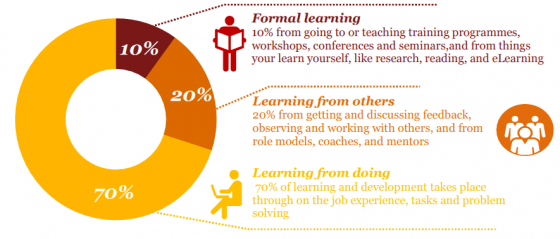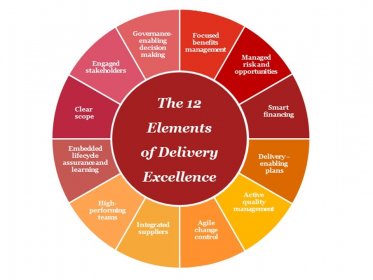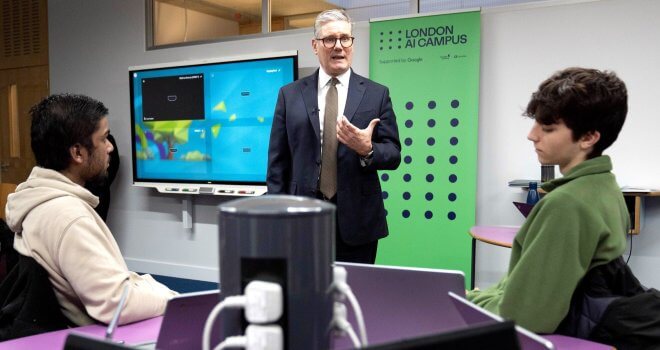Developing The ‘Perfect’ PPM Professional

PPM training and development is a hot topic and it has been for some time. The 4th PwC Global PPM Survey revealed that in the majority of organisations less than 40% of people are certified in the organisation’s programme delivery methodology and 55% thought that their organisation did not provide enough programme management training.
So it seems that PPM practitioners are crying out for training and development, but what is the optimal way to provide this and can a perfect professional be created?
PwC share the same challenges as many of our clients in finding the optimal blend of development to produce well rounded, high performing PPM professionals.
Regardless of grade or experience our development approach broadly aligns to the ‘70:20:10’ Learning and Development model that is illustrated below.
The majority of personal and professional growth is undertaken ‘on the job’ – as people undertake one of our many challenging, fascinating and diverse client engagements. Development is also fostered by peers through social learning with colleagues, both informally and through formal methods like mentoring arrangements and written feedback.

We believe that excellent colleagues and challenging and interesting work are the main catalysts and enablers for the progression of a person’s skills. If we give talented and dedicated people the right environment then they will self improve through experience, observation, self reflection and discussion with their like minded co-workers.
To compliment this approach, we also offer a broad range of formal learning opportunities. Some are specific to our PPM Practice, which are based on our 12 elements of Programme Excellence, while others are broader opportunities open to everyone in PwC – and of course we encourage people to do professional qualifications.

We encourage our people to undertake professional qualifications because they distil and impart a huge amount of best practice; provide a framework within which to work that is widely recognised and the approaches they promulgate are tried and tested. They are also useful to credentialise the individual and show our firm’s capability.
In our search to discover the optimal approach to PPM development and in our efforts to apply the 70:20:10 model it has become clear that the value an individual receives from each type of learning depends upon many factors, not least where they are in their careers and their level of experience.
In general we find that those early in their careers tend to value professional qualifications and formal learning more than those who are a little longer in the tooth.
But we wanted to understand even better how our people related to the 70:20:10 approach and how much they valued each type of development opportunity. To that end, we surveyed our UK Portfolio and Programme Management competency in Consulting, a group of circa 160 people.
Our survey said (forgive the ‘Family Fortunes’ reference) that we have a high number of staff with PPM professional qualifications, with a broad range of professional bodies and exam boards reflected.
These staff said they used their qualifications in their work and with clients, however when asked to describe the specific application we didn’t get highly impactful responses, with a shared methodology and common parlance being the most often cited examples of use.
‘I believe that completing the PPM professional qualifications gave me a good base of understanding of how PPM can be used, however, I feel it is limited by the minimal practical experience you gain from the qualification.’
Interestingly, they thought their clients valued their qualifications, but only when coupled with relevant technical and context specific experience.
‘Clients want to hear about and trust experience (war stories) from other clients. They also get benefit from our ability to draw on experience across particular industries or sectors.’
What became clear from the survey responses was that as people gained more experience and seniority they attributed their learning and their work success to their personal ‘on-the-job’ experience.
This isn’t surprising, as people tend to undertake less formal training the more experienced they become and it is the more junior staff who undertake – and are encouraged (partly due to lower abstraction costs) – to engage in training.
‘The more senior you get, the less valuable they [qualifications] become since you’ll have grown your network and reputation and can draw on your client experiences, which in many cases is more desirable to clients than a few letters next to your name.’
The views expressed in our survey appear to lend weight to the comments made by John Wooden, the American educator and basketball coach, who said, when speaking on the value of experience “It’s what you learn after you know it all that counts.”
In many ways, formal training and professional qualifications are often used as a proxy for experience. The organisations that administer some professional qualifications aim to address this by setting expiry dates on their courses (for example, PRINCE2 Practitioner expires after three years) thereby encouraging people to continue to study throughout their career.
However, it shouldn’t be ‘either/or’ when considering formal training and experience. Rather, experience and formal learning form a virtuous circle, with the value of formal training increasing as the student increases in experience.
Experience means they have something on which to apply new concepts and they are more likely to have the opportunity to directly apply the learning once they are back out in the business. Their cost of abstraction may be high, but the value and impact they can bring is also exponentially higher.
The optimal approach to learning and development for PPM professionals depends on the individual and where they are in their career.
It undoubtedly entails blending all approaches and interventions at an organisation’s disposal, and formal learning and professional qualifications definitely have a part to play but their role mustn’t be over emphasised.
As for creating a perfect PPM professional, there clearly isn’t such a thing. In the words of Salvador Dali: “Have no fear of perfection – you’ll never reach it.”
Andy Peake is Senior Manager and Alex Whitehead is Senior Associate at PwC.




